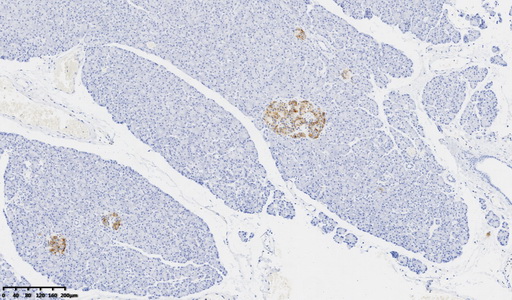Chromogranin A (CHGA) Mouse Monoclonal Antibody [Clone ID: OTI12E5]
CAT#: CF814051
Carrier-free (BSA/glycerol-free) CHGA mouse monoclonal antibody, clone OTI12E5
Frequently bought together (3)
Transient overexpression lysate of chromogranin A (parathyroid secretory protein 1) (CHGA)
USD 396.00
Other products for "CHGA"
Specifications
| Product Data | |
| Clone Name | OTI12E5 |
| Applications | IHC |
| Recommended Dilution | IHC 1:50 |
| Reactivities | Human |
| Host | Mouse |
| Isotype | IgG1 |
| Clonality | Monoclonal |
| Immunogen | Human recombinant protein fragment corresponding to amino acids 241-457 of human CHGA (NP_001266) produced in E.coli. |
| Formulation | Lyophilized powder (original buffer 1X PBS, pH 7.3, 8% trehalose) |
| Reconstitution Method | For reconstitution, we recommend adding 100uL distilled water to a final antibody concentration of about 1 mg/mL. To use this carrier-free antibody for conjugation experiment, we strongly recommend performing another round of desalting process. (OriGene recommends Zeba Spin Desalting Columns, 7KMWCO from Thermo Scientific) |
| Purification | Purified from mouse ascites fluids or tissue culture supernatant by affinity chromatography (protein A/G) |
| Conjugation | Unconjugated |
| Storage | Shipped at -20°C or with ice packs, Upon delivery store at -20°C. Dilute in PBS(pH7.3) if necessary. Stable for 12 months from date of receipt. Avoid repeated freeze-thaws. |
| Stability | Stable for 12 months from date of receipt. |
| Predicted Protein Size | 50.7 kDa |
| Gene Name | Homo sapiens chromogranin A (CHGA), transcript variant 1, mRNA. |
| Database Link | |
| Background | The protein encoded by this gene is a member of the chromogranin/secretogranin family of neuroendocrine secretory proteins. It is found in secretory vesicles of neurons and endocrine cells. This gene product is a precursor to three biologically active peptides; vasostatin, pancreastatin, and parastatin. These peptides act as autocrine or paracrine negative modulators of the neuroendocrine system. Two other peptides, catestatin and chromofungin, have antimicrobial activity and antifungal activity, respectively. Two transcript variants encoding different isoforms have been found for this gene. [provided by RefSeq, Sep 2014] |
| Synonyms | CGA |
| Reference Data | |
| Protein Families | Druggable Genome, Secreted Protein |
Documents
| Product Manuals |
| FAQs |
| SDS |
{0} Product Review(s)
0 Product Review(s)
Submit review
Be the first one to submit a review
Product Citations
*Delivery time may vary from web posted schedule. Occasional delays may occur due to unforeseen
complexities in the preparation of your product. International customers may expect an additional 1-2 weeks
in shipping.






























































































































































































































































 Germany
Germany
 Japan
Japan
 United Kingdom
United Kingdom
 China
China






